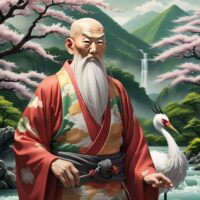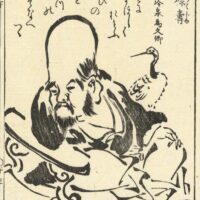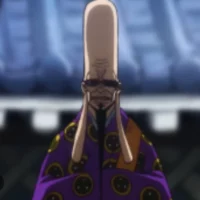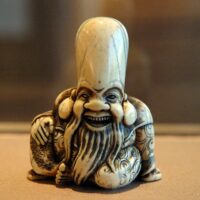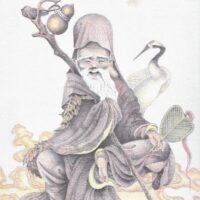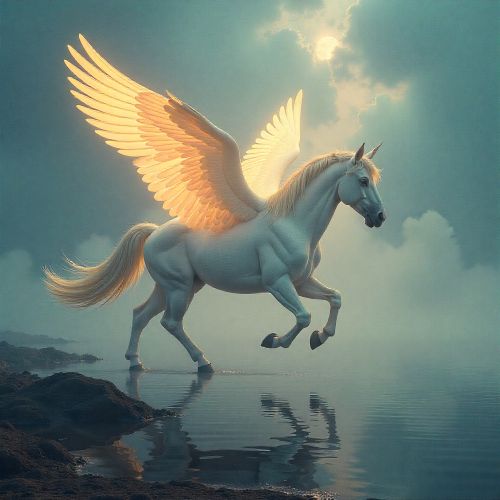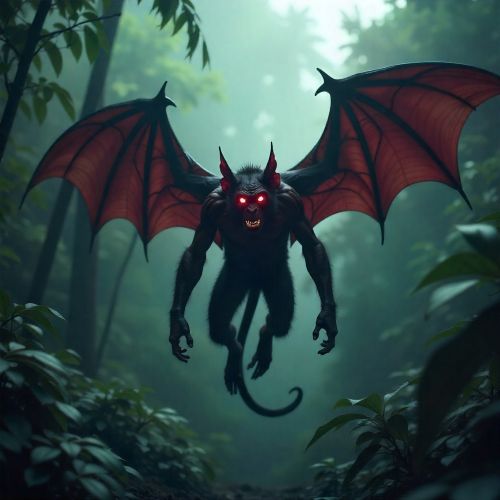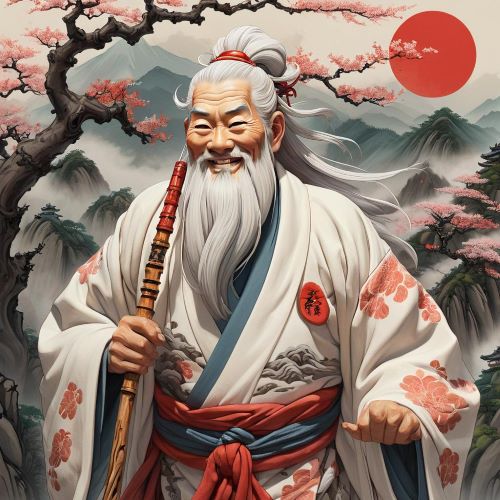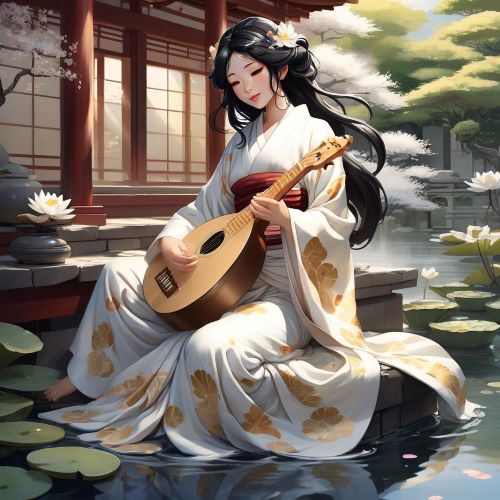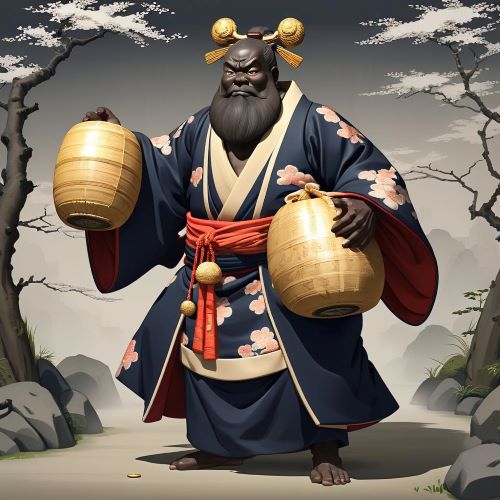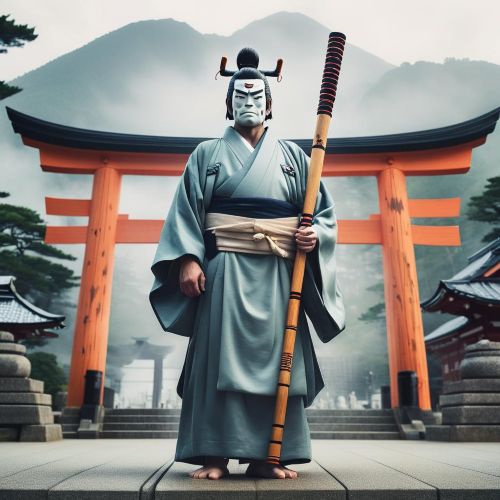Fukurokuju : God of Wisdom
Listen
At a glance
| Description | |
|---|---|
| Origin | Japanese Mythology |
| Classification | Gods |
| Family Members | N/A |
| Region | Japan |
| Associated With | Wisdom, Revival of Dead |
Fukurokuju
Introduction
Fukurokuju, a deity embodying happiness (fuku), wealth (roku), and longevity (ju) in Japanese, is part of the esteemed Shichi-fuku-jin, or Seven Lucky Gods. Revered in Japanese mythology, he symbolizes wisdom, longevity, and prosperity. As one of the Seven Lucky Gods, Fukurokuju is celebrated for his intellect and his role in bestowing blessings of good fortune upon believers.
Physical Traits
Fukurokuju is visually striking, typically portrayed as a short, elderly man with a bald head and a flowing white beard that extends down his chest. His most distinctive feature is his elongated forehead, symbolizing the immense wisdom he has accrued over his long existence. Adorned in richly colored robes, often in vibrant shades of red or gold, Fukurokuju embodies prosperity and happiness. He carries a long staff, sometimes embellished with a jade disc or topped with a peach, both symbols of longevity in Chinese tradition. Depictions often show him with a sacred book on his staff, believed to hold the names and lifespans of all humans.
Animal companions accompany Fukurokuju in his iconography: a crane, known for its longevity and graceful movements, and a turtle, revered for its slow and steady lifespan. Occasionally, a black deer appears by his side, a mythical creature said to turn black after living for more than 2,000 years. This imagery underscores Fukurokuju’s association with wisdom, longevity, and the blessings of good fortune in Japanese culture.
Family
Fukurokuju’s origins trace back to Chinese mythology, where he is believed to be influenced by the Three Star Gods (Fu Lu Shou), who embody happiness, wealth, and longevity respectively. In particular, he shares connections with Shou, the Chinese deity associated with wisdom and longevity. Within Japanese mythology, Fukurokuju is often identified with Jurojin, another deity linked to longevity and wisdom, suggesting they may be different aspects of the same divine entity. His exact familial relationships within the Seven Lucky Gods vary across legends; some depict him as the grandfather of Jurojin, while others view them as interconnected or interchangeable figures. These associations highlight Fukurokuju’s role as a symbol of prosperity and good fortune alongside other revered deities like Ebisu and Daikoku in Japanese folklore.
Other names
Beyond his familiar moniker, Fukurokuju boasts a collection of alternative names. “Hokurokuju” reflects the phonetic translation of his name in Chinese characters, a nod to his Chinese roots. His association with the South Pole star earned him the title “Nankyokurojin” (Old Man of the South Pole). Interestingly, Chinese mythology offers another name, “Fushoulu,” highlighting his shared domain of prosperity and longevity. But Fukurokuju’s names go deeper. “Fukurokami” underscores his connection to wealth and happiness, while other variations emphasize the longevity and good health he embodies. This tapestry of names reveals the multifaceted nature of Fukurokuju, a deity who transcends the boundaries of the spiritual and earthly realms.
Powers and Abilities
As a member of the Seven Lucky Gods, Fukurokuju embodies a range of blessings for his devotees. He is primarily revered for his ability to grant long life and good health. Legends depict him possessing the power to extend lifespans and even bring the dead back to life, although this ability is rarely shown.
Fukurokuju is also considered a harbinger of wisdom and prosperity. His vast knowledge and experience are believed to guide individuals towards wise decisions, leading to success and happiness. The sacred book he carries is said to contain the secrets of longevity and prosperity, and some believe he can bestow knowledge upon those deemed worthy.
Modern Day Influence
Fukurokuju’s image continues to hold significance in Japanese culture today. He is a popular figurine, often displayed in homes and businesses as a symbol of good luck and longevity. His image can be seen on amulets and charms worn for protection and blessings. During celebrations for the New Year, he is featured alongside the other Seven Lucky Gods, bringing hope for a prosperous year ahead.
Beyond traditional practices, Fukurokuju has found his way into modern media. He appears in anime, manga, and video games, often depicted with a humorous twist on his traditional appearance. This modern interpretation helps to keep the legend of Fukurokuju alive for younger generations.
Related Images
Frequently Asked Questions
What is lorem Ipsum?
I am text block. Click edit button to change this text. Lorem ipsum dolor sit amet, consectetur adipiscing elit. Ut elit tellus, luctus nec ullamcorper mattis, pulvinar dapibus leo.
What is lorem Ipsum?
I am text block. Click edit button to change this text. Lorem ipsum dolor sit amet, consectetur adipiscing elit. Ut elit tellus, luctus nec ullamcorper mattis, pulvinar dapibus leo.
What is lorem Ipsum?
I am text block. Click edit button to change this text. Lorem ipsum dolor sit amet, consectetur adipiscing elit. Ut elit tellus, luctus nec ullamcorper mattis, pulvinar dapibus leo.
What is lorem Ipsum?
I am text block. Click edit button to change this text. Lorem ipsum dolor sit amet, consectetur adipiscing elit. Ut elit tellus, luctus nec ullamcorper mattis, pulvinar dapibus leo.
What is lorem Ipsum?
I am text block. Click edit button to change this text. Lorem ipsum dolor sit amet, consectetur adipiscing elit. Ut elit tellus, luctus nec ullamcorper mattis, pulvinar dapibus leo.


